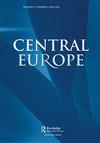Bringing Order Out of Chaos: Stanisław August Poniatowski’s Political Patronage of Architectural Classicism in the Late Eighteenth-Century Polish-Lithuanian Commonwealth
IF 0.1
2区 历史学
Q2 HISTORY
引用次数: 1
Abstract
ABSTRACT This article examines the political uses of classical architecture in the late eighteenth-century Polish-Lithuanian Commonwealth. It focuses specifically on the direct connection between the rise of the classical idiom on the eve of the collapse of the Commonwealth and the ill-fated idea of political recuperation of the deteriorating and dysfunctional state under the aegis of King Stanisław August Poniatowski (r. 1764–95). In particular, it outlines the extent and character of Polish-Lithuanian architectural classicism’s political engagement in the last decades of the eighteenth century. It also underscores the specific role of this architectural idiom as a political symbol and instrument of propaganda, which served to represent the idea of restoring political order to the Commonwealth and building a strong and self-sustaining political community headed by the king. Finally, it presents a selection of characteristic buildings and publications that contributed to this political discourse, and examines the ways classical architecture retained a political importance in the immediate aftermath of the destruction of the Polish-Lithuanian Commonwealth in 1795.从混乱中带来秩序:Stanisław奥古斯特·波尼亚托夫斯基在18世纪后期波兰立陶宛联邦建筑古典主义的政治赞助
本文考察了18世纪后期波兰立陶宛联邦古典建筑的政治用途。它特别关注了在联邦崩溃前夕古典成语的兴起与在国王Stanisław August Poniatowski (r. 1764-95)的支持下对日益恶化和功能失调的国家进行政治恢复的不幸想法之间的直接联系。特别是,它概述了波兰立陶宛建筑古典主义在18世纪最后几十年的政治参与程度和特点。它还强调了这种建筑风格作为政治象征和宣传工具的特殊作用,它代表了恢复联邦政治秩序和建立一个由国王领导的强大和自我维持的政治共同体的想法。最后,它展示了对这种政治话语做出贡献的特色建筑和出版物的选择,并研究了古典建筑在1795年波兰立陶宛联邦被摧毁后保持政治重要性的方式。
本文章由计算机程序翻译,如有差异,请以英文原文为准。
求助全文
约1分钟内获得全文
求助全文
来源期刊

Central Europe
HISTORY-
CiteScore
0.20
自引率
0.00%
发文量
7
期刊介绍:
Central Europe publishes original research articles on the history, languages, literature, political culture, music, arts and society of those lands once part of the Habsburg Monarchy and Poland-Lithuania from the Middle Ages to the present. It also publishes discussion papers, marginalia, book, archive, exhibition, music and film reviews. Central Europe has been established as a refereed journal to foster the worldwide study of the area and to provide a forum for the academic discussion of Central European life and institutions. From time to time an issue will be devoted to a particular theme, based on a selection of papers presented at an international conference or seminar series.
 求助内容:
求助内容: 应助结果提醒方式:
应助结果提醒方式:


